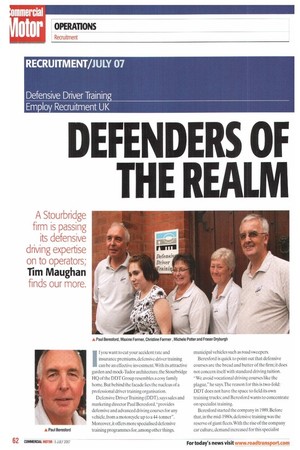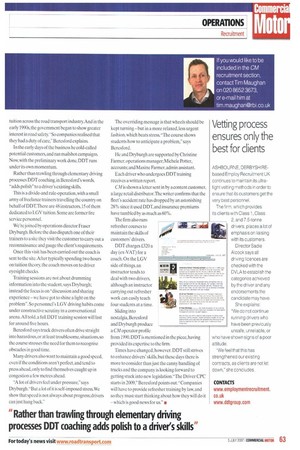DEFENDERS OF THE REALM
Page 66

Page 67

If you've noticed an error in this article please click here to report it so we can fix it.
If you want to cut your accident rate and insurance premiums, defensive driver training can be an effective investment. With its attractive garden and mock-Tudor architecture, the Stourbridge HQ of the DDT Group resembles a cosy family home.. But behind the facade lies the nucleus of a professional driver training organisation.
Defensive Driver Training (DDT), says sales and marketing director Paul Beresford, provides defensive and advanced driving courses for any vehicle, from a motorcycle up to a 44-tonner". Moreover, it offers more specialised defensive training programmes for, among other things, municipal vehicles such as road sweepers.
Beresford is quick to point out that defensive courses are the bread and butter of the firm; it does not concern itself with standard driving tuition. "We avoid vocational driving courses like the plague," he says.The reason for this is two-fold: DDT does not have the space to field its own training trucks; and Beresford wants to concentrate on specialist training.
Beresford started the company in 1989. Before that, in the mid4980s, defensive training was the reserve of giant fleets. With the rise of the company car culture, demand increased for this specialist tuition across the road transport industry.And in the early 1990s, the government began to show greater interest in road safety. "So companies realised that they had a duty of care," Beresford explains.
In the early days of the business he cold-called potential customers, and ran mailshot campaigns. Now, with the preliminary work done, DDT runs under its own momentum.
Rather than trawling through elementary driving processes DDT coaching, in Beresford's words, "adds polish" to a driver's existing skills.
This is a divide-and rule-operation, with a small army of freelance trainers travelling the country on behalf of DDTThere are 48 instructors,15 of them dedicated to LGV tuition. Some are former fire service personnel.
We're joined by operations director Fraser Dryburgh. Before the duo dispatch one of their trainers to a site they visit the customer to carry out a reconnaissance and gauge the client's requirements.
Once this visit has been carried out the coach is sent to the site. After typically spending two hours on tuition theory, the coach moves on to driver eyesight checks.
Training sessions are not about drumming information into the student, says Dryburgh; instead the focus is on "discussion and sharing experience— we have got to shine a light on the problem". So personnel's LGV driving habits come under constructive scrutiny in a conversational arena.All told, a full DDT training session will last for around five hours.
Beresford says truck drivers often drive straight into hazardous, or at least troublesome,situations,so the course stresses the need for them to recognise obstacles in good time.
Many drivers also want to maintain a good speed, even if the conditions aren't perfect, and tend to press ahead, only to find themselves caught up in congestion a few metres ahead.
"A lot of drivers feel under pressure," says Dryburgh."But a lot of it is self-imposed stress. We show that speed is not always about progress; drivers can just hang back." The overriding message is that wheels should be kept turning — but in a more relaxed, less urgent fashion, which beats stress. "The course shows students how to anticipate a problem," says Beresford.
He and Dryburgh are supported by Christine Farmer, operations manager; Michele Potter, accounts; and Maxine Farmer, admin assistant.
Each driver who undergoes DDT training receives a written report.
CM is shown a letter sent in by a content customer, a large retail distributor.The writer confirms that the fleet's accident rate has dropped by an astonishing 28% since it used DDT, and insurance premiums have tumbled by as much as 60%.
The firm also runs refresher courses to maintain the skills of customers' drivers.
DDT charges £320 a day (ex-VAT) for a coach. On the LGV side of things, an instructor tends to deal with two drivers, although an instructor carrying out refresher work can easily teach four students at a time.
Sliding into nostalgia. Beresford and Dryburgh produce a CM operator profile from 1990.DDT is mentioned in the piece,having provided its expertise to the firm.
limes have changed, however. DDT still strives to enhance drivers' skills, but these days there is more to consider than just the canny handling of trucks and the company is looking forward to getting stuck into new legislation."The Driver CPC starts in 2009," Beresford points out. "Companies will have to provide refresher training by law, and so they must start thinking about how they will do it —which is good news for us." • 17,00.1M,141.114.0 IA, 0110^ wr..• WI, IMP New
W• ron • woe
1/44,1,
CRISS .VIV






























































































































































































